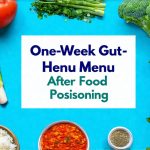Illness, whether it’s a viral infection like the flu, a bacterial issue such as food poisoning, or even a chronic condition flare-up, often takes a significant toll on our bodies beyond the initial symptoms. While we focus on recovering from the immediate sickness, a crucial aspect that frequently gets overlooked is the impact on our gut health. The gut microbiome – the trillions of bacteria, fungi, viruses and other microorganisms residing in our digestive tract – plays an integral role not just in digestion but also in immunity, mental wellbeing, and overall health. When we’re ill, especially with conditions requiring antibiotic treatment, this delicate ecosystem can be profoundly disrupted, leading to imbalances that contribute to lingering symptoms and hinder full recovery.
Supporting gut healing isn’t about a quick fix; it’s a holistic approach focused on nourishing the microbiome and restoring its functionality. It acknowledges the interconnectedness of our body systems and recognizes that true wellness stems from addressing the root causes of imbalance, not just masking the symptoms. This means looking beyond simply “feeling better” and instead focusing on rebuilding a resilient gut foundation to prevent future issues and optimize long-term health. The following information is intended as general guidance and should be discussed with your healthcare provider before making significant changes to your diet or lifestyle. You might need to support enzyme production during this process.
Understanding Gut Disruption Post-Illness
The gut microbiome is remarkably adaptable, but illness can throw it into chaos in several ways. Infections – both viral and bacterial – can directly impact the composition of the microbial community. Antibiotics, while life-saving when necessary, are notoriously indiscriminate, killing off not only harmful bacteria but also many beneficial ones. This creates an opportunity for opportunistic pathogens to flourish, leading to dysbiosis – an imbalance in gut flora. Even seemingly mild illnesses like a bad case of stomach flu can disrupt the gut lining and its protective barrier function, increasing intestinal permeability (often referred to as “leaky gut”).
This disruption isn’t just about bacterial numbers; it’s also about functionality. The microbiome performs essential tasks like fermenting fiber into short-chain fatty acids (SCFAs) – vital nutrients for gut cells and overall health – and synthesizing vitamins. When the microbiome is impaired, these functions are compromised, leading to reduced nutrient absorption, weakened immunity, and potentially systemic inflammation. Symptoms of a disrupted gut post-illness can be varied and include bloating, gas, diarrhea or constipation, fatigue, brain fog, skin issues, and even mood changes. Recognizing these signals is the first step toward supporting healing. You could consider supplements to support gut barrier function at this stage.
A key concept to remember is that the gut isn’t isolated; it communicates extensively with other parts of the body through what’s known as the gut-brain axis. A healthy gut supports a healthy brain, and vice versa. Therefore, addressing gut health can have far-reaching benefits beyond digestive function. Restoring balance requires patience and a multifaceted approach focusing on diet, lifestyle factors, and potentially targeted supplementation. If you’ve recently been ill, it might be time to reset the gut.
Dietary Strategies for Gut Healing
Diet plays a pivotal role in gut healing. The goal is to nourish beneficial bacteria while minimizing inflammation and supporting the repair of the gut lining. This often means adopting an elimination diet approach – temporarily removing foods known to irritate the gut and then slowly reintroducing them to identify sensitivities. While this isn’t always necessary, it can be incredibly helpful in identifying triggers and reducing inflammation. Focus on whole, unprocessed foods as a starting point.
- Prioritize easily digestible foods: Begin with simple carbohydrates like well-cooked rice, sweet potatoes, or bananas. These are gentle on the digestive system and provide readily available energy.
- Increase fiber intake gradually: Fiber is essential for feeding beneficial bacteria, but too much too soon can exacerbate symptoms. Start with small amounts of cooked vegetables and low-FODMAP fruits (like blueberries) and slowly increase as tolerated.
- Incorporate fermented foods: Foods like yogurt (with live cultures), kefir, sauerkraut, kimchi, and kombucha are rich in probiotics – beneficial bacteria that can help repopulate the gut. However, introduce these cautiously, as they can sometimes cause temporary digestive upset initially.
Beyond specific food choices, hydration is critical. Water helps flush out toxins and supports optimal digestion. Consider bone broth for its collagen content, which may aid in repairing the gut lining. Avoiding processed foods, sugar, alcohol, and caffeine are also important steps, as these can all contribute to inflammation and disrupt the microbiome. Remember that dietary needs vary from person to person; what works for one individual may not work for another. Taking time to train your gut is an investment in long-term health.
Supporting Microbiome Diversity
Diversity within the gut microbiome is strongly correlated with better health outcomes. A more diverse ecosystem is more resilient and better equipped to withstand challenges like illness or antibiotic use. Beyond fermented foods, we can actively promote diversity through dietary choices:
- Eat a wide variety of plant-based foods: Different plants contain different types of fiber and polyphenols – compounds that nourish different bacterial species. Aim for at least 30 different plant-based foods per week.
- Include prebiotic-rich foods: Prebiotics are essentially food for probiotics. They’re found in foods like garlic, onions, leeks, asparagus, bananas, and oats. These help feed the beneficial bacteria already present in your gut.
- Consider a probiotic supplement (with caution): Probiotic supplements can be helpful in some cases, but it’s important to choose one with well-researched strains and to consult with a healthcare professional before starting supplementation. Not all probiotics are created equal, and the wrong strain could potentially worsen symptoms.
It’s also worth noting that personalized nutrition is gaining traction as a way to optimize gut health. This involves analyzing your microbiome through testing (stool analysis) and tailoring dietary recommendations based on your specific microbial profile. Understanding how to set boundaries can also help with diet compliance.
Reducing Inflammation & Gut Permeability
Inflammation is a natural part of the healing process, but chronic inflammation can hinder recovery and contribute to ongoing symptoms. Dietary strategies to reduce inflammation include:
- Increase omega-3 fatty acid intake: Found in fatty fish (salmon, mackerel), flaxseeds, chia seeds, and walnuts, omega-3s have anti-inflammatory properties.
- Incorporate turmeric: This spice contains curcumin, a powerful antioxidant and anti-inflammatory compound.
- Limit inflammatory foods: These include processed foods, sugar, red meat, dairy (for some individuals), and gluten (if sensitive).
Addressing gut permeability is also crucial. A damaged gut lining allows undigested food particles and toxins to enter the bloodstream, triggering an immune response and contributing to inflammation. Strategies to support gut barrier function:
- Consume collagen-rich foods: Bone broth, gelatin, and collagen supplements may help repair the gut lining.
- L-glutamine supplementation (with caution): L-glutamine is an amino acid that plays a role in maintaining gut integrity. However, it’s important to consult with a healthcare professional before supplementing, as it may not be suitable for everyone.
Lifestyle Factors for Gut Health
Diet isn’t the only factor influencing gut health; lifestyle plays a significant role. Stress management is paramount, as chronic stress can negatively impact the microbiome and contribute to inflammation. Practices like meditation, yoga, deep breathing exercises, and spending time in nature can help reduce stress levels. Regular physical activity also supports gut health by improving blood flow, reducing inflammation, and promoting microbial diversity. It’s important to maintain gut health even during stressful times.
- Prioritize sleep: Aim for 7-9 hours of quality sleep per night. Sleep deprivation disrupts the microbiome and weakens the immune system.
- Minimize antibiotic use (when possible): Antibiotics are essential when needed, but overuse can decimate the gut microbiome. Discuss alternatives with your healthcare provider whenever appropriate.
- Avoid unnecessary NSAIDs: Nonsteroidal anti-inflammatory drugs (NSAIDs) can irritate the gut lining and contribute to inflammation. Use them only when necessary and explore alternative pain management strategies.
Ultimately, supporting gut healing after illness is a journey that requires patience, self-awareness, and a commitment to holistic wellbeing. It’s about understanding the interconnectedness of our bodies and prioritizing practices that nurture both physical and mental health. Remember to consult with your healthcare provider for personalized guidance and support.


















